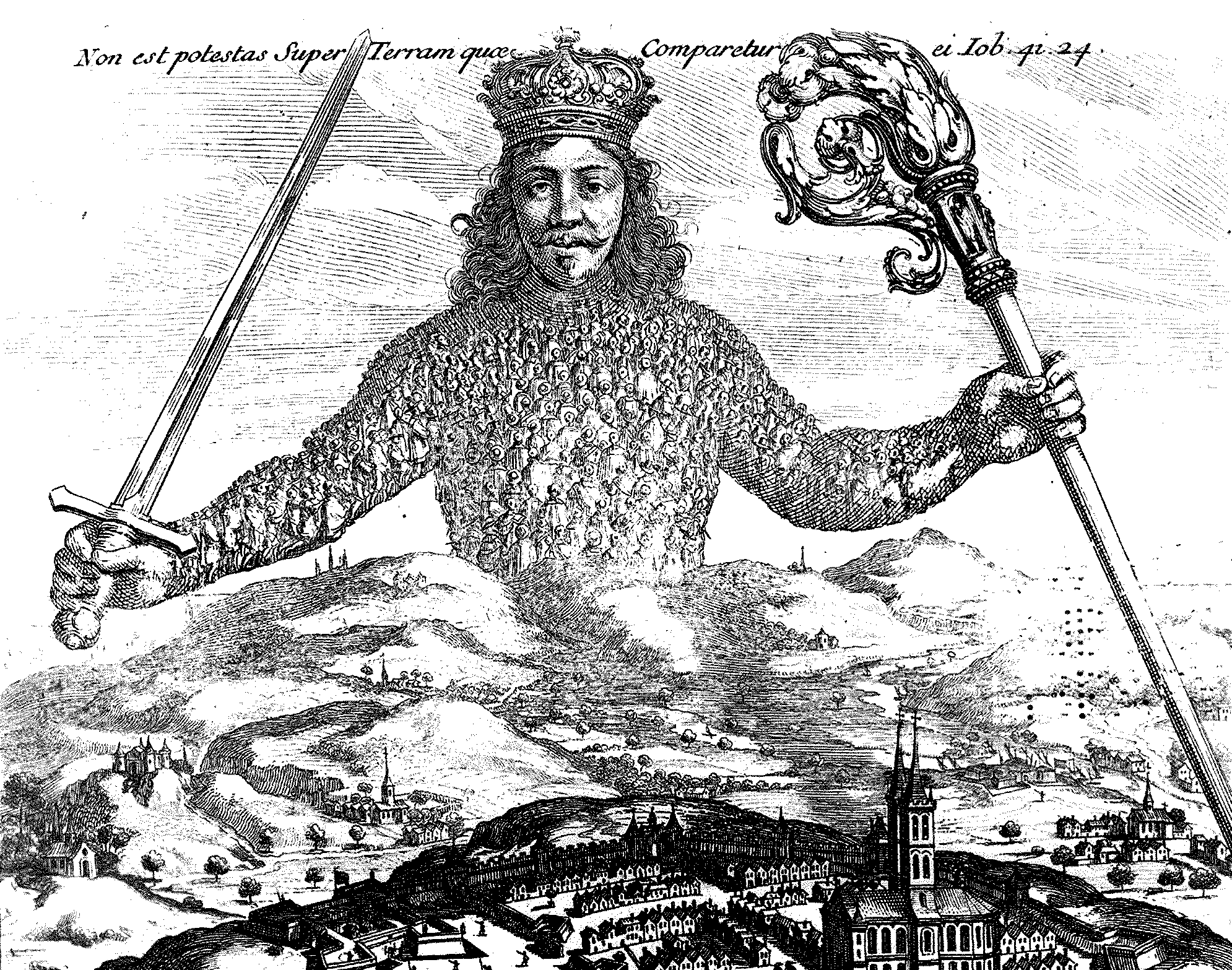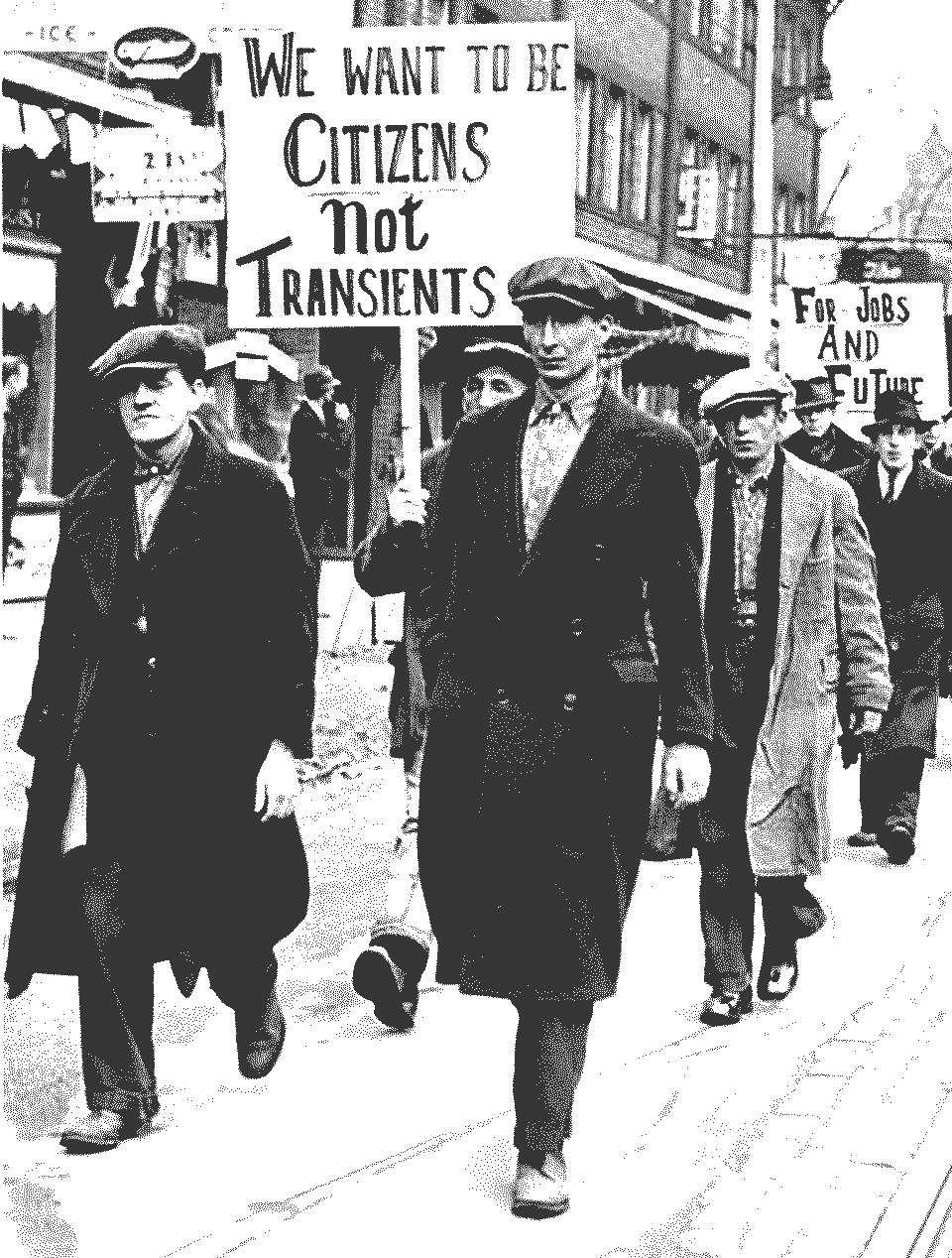Guest author : Kristian Lukic
According to Bulgarian theoretician Alexander Kiossev, there is something that he calls “Self-colonizing metaphor”. He used this concept for explaining cultures subordinated to the cultural power of Europe and the West without having been invaded and turned into colonies in actual fact. He named this a hegemony without domination. As it all took place beyond colonial realities—military occupation, political dominance, administrative rule, and economic exploitation—social imagination had a key role to play throughout the process. In short, it could be described as colonisation with love.
Facebook is currently a major algorithmic colonial agent that might be indeed described as COLONIZATION with love.

Frontispiece of the book Leviathan by Thomas Hobbes (1651), Source : WIKIPEDIA
Understanding Facebook in the light of Foucault’s notion of modern power, we can begin to think of Facebook as an institution in which individuals are shaped and submitted to specific structures, which turns them from human beings into “self controlling subjects fitted for democratic capitalist society” (Lyon 2006). Exploitation would be a structural category that today also affects web 2.0 users, whose time, attention, personal data, talent/skills, education/training and materials are exploited. Given the structural character of exploitation, it would still be exploitation, even if people like it (Fuchs).
According to the recent research done by Happiness Research Institute from Copenhagen, in which they ask 1095 daily Facebook users to quit Facebook for one week they’ve come to interesting conclusions. Participants aged between 16 and 76 were asked before the experiment started how satisfied they felt, how active their social life was, how easy they could concentrate and how much they compared themselves to others. After the experiment was finished, the group that had abstained reported higher level of life satisfaction, better focus, feeling less lonely and sad. So, with the general relief experienced during the Facebook “vacation”, Facebook showed parallels with general feeling of working condition, a sense of “not wasting the time”, less stressed, more sociable, better life satisfaction.
New York University professors Helen Nissenbaum and Finn Brunton claim that today, approximately 10 years after social media were introduced, “The social cost of opting out has become so high that opting out is essentially a fantasy”. They propose different tactics in undermining asymmetrical power relations between proprietary platforms like Facebook and users. The deliberate addition of ambiguous, confusing, or misleading information interferes with surveillance and data collection. Difficulties for Facebook in precise targeting would be in that sense misleading information, links leading to strange or wrong websites, putting wrong data, several accounts and profiles, etc…
Context Collapse
In his essay, Autonomy and Control in the Era of Post-Privacy media, theorist Felix Stalder analyses a historical change in the perception and the role of privacy in the West. The sphere of privacy was citizen’s domain where the state does not have the right to interfere. Citizens’ obligation was to be loyal, to obey the rules, and to financially support state affairs through various kinds of taxation. The private law protected the subject from the eyes of the government and without special court permission under the assumption of criminal act, state officials were being forbidden to enter private property. Sure, the state security apparatus was illegally interested and engaged in gathering private data, but officially it was not allowed.
Stalder claims that the sacred sphere of privacy is rapidly changing and that users are not concerned with protecting the privacy realm anymore. With the rise of social media (and especially Facebook) we are witnessing massive amounts of private data, images that users voluntarily upload.
Before social media, social life had relatively separate areas. One area was one’s family, other was the professional circle, another were friends, circle around your hobby, etc. Sometimes these spheres of social life overlap, but mostly there was clear boundary between them.
 Source: Facebook
Source: Facebook
With social media and especially with Facebook these boundaries are blurring, so now all aspects of your social life are visible to all your social spheres. In sociology there is a term to describe that, the context collapse. Zuckerberg was praising this context collapse famously saying: “You have one identity; the days of you having a different image for your work friends or your co-workers and for the people you know are probably coming to an end pretty quickly”. Indeed Mark Zuckerberg looks identical when he is publicly talking during yearly Facebook venue for example, or when he is having interview, or when talking with president Obama or having precious time with his family.
But there is a recent trend, and Zuckerberg openly raised concerns about context restoration, which is a situation where more and more users do not give and share personal content, as it was previously the case. So users grew up and especially Facebook natives (teenagers) are concerned with it, thus moving to other platforms (like Snapchat for example). This means that Facebook slowly transfer itself into the public arena in a way that users are quite aware of the Facebook Panopticon. With rapidly growing precarity, job losses and automatization, Facebook would probably be the platform for performing professional potentialities and capabilities. Facebook would become a platform for professional networks with users who would act as private persons but this face would be a professional one. (Person, a mask in old greek). This means lowering the amount of private affairs (in narrower sense), like images of children, pets, private parties, etc. The latest acquisition of LinkedIn by Microsoft for 26 billion USD shows that the future battle will be a global battle for work with all means necessary, and that Facebook, Twitter, LinkedIn, (now with huge cash boost) together with growing Uber, Airbnb, Upwork, Behance etc will be megafactories for future proletariat and unemployed.
Human component in algorithmic factory
“viewer ought to be paid for watching tv”
Jean Luc Godard
Considering the growing global socio-economic disproportions and similarly growing importance of entrepreneurial tech companies that use collaborative platform model for their businesses there is a need to look at forgotten stakeholder – the producer of content, the human. Right now the producers of Facebook content are completely outside of Facebook financial environment.
Artist Laurel Ptak’s draws on the shifting condition from Fordism to post-Fordism with her ‘Wages for Facebook’, where she substitutes the word ‘housework’ for Facebook. Launched as a website in January 2014 at wagesforfacebook.com, it was immediately graced with over 20,000 views and rapidly and internationally debated on social media, message boards and in the mainstream, left and art press—clearly touching a collective nerve and beginning a broader public conversation about worker’s rights and the very nature of labour, as well as the politics of its refusal, in our digital age.
The privilege of sharing private data would be specialised for those who are self employed and who are not directly dependent on external employers. Facebook profile is becoming enlarged CV and proper balance between private and professional content would need to be carefully managed. This would have huge impact on the possibility of employment. As a user has unique profile it is not possible to model it according to the job demand description as it is the case with traditional job application with CV. For traditional job application, applicant usually highlighted skills and experiences that would fit to the needed specific concrete job description and remove those that are not suitable. But with the concept of a unique identity, those that are highly specialised and do not have complex multifaceted carrier would benefit more than those who have more general working experience. As already is the case, the narrow specialisation is already happening.

Great Depression in the United States
The huge gap between being socially isolated (not participating in Facebook) and maintaining proper profile would become highly stressful. Freelancers, self employed, unemployed and all those grey areas in between that now constitute the world of labour would need to spend more and more hours maintaining Facebook profiles offering in(directly) their expertise, experience, success stories, opinions and documentation of their works and activities, in similar fashion like sex workers in windows of red light districts.
All of this and much more has been recently developed by Facebook. According to Armin Arvidson Facebook with its algorithms might aim at becoming a sort of universal clearinghouse that deploys the logic of the derivative to determine the value of social relations outside of advertising markets, to provide analysis of attention, reliability and risk of social relations to wide range of operators like insurance companies, mortgage banks and employers.
Financialisation of everyday life
“Facebook will market you your future before you’ve even gotten there, they’ll use predictive algorithms to figure out what’s your likely future and then try to make that even more likely. They’ll get better at programming you – they’ll reduce your spontaneity. “
Douglas Rushkoff
“Orit Halpern’s book, Beautiful Data, suggests that we live not so much in worlds of pure simulation a la Jean Baudrillard (or Philip K. Dick), but instead, in a fascinated relation with flows of signals whose referential nature does not stop them from forming a “new landscape” for the viewer/user. In other words, the data is ostensibly about the world, but it upstages that world, becoming the primary object with which we interact (and thereby impoverishing the rest of experience). Something similar is suggested by Karin Knorr Cetina with her notion of “postsocial relations” carried on with the always-unfolding temporal objects that typically appear on screens, notably in the realm of finance. The stream of flow-objects constitutes a world, one you can dive into, wrestle with, and from which – in the case of financial traders – you dream of emerging victorious.” (Brian Holmes)
 Facebook drone – Aquila
Facebook drone – Aquila
As Facebook is investing in and developing infrastructure to cover all corners of the globe there is sound possibility that Facebook algorithms will be major agent in “financialisation of everyday life (Martin, R. 2002). In this sense Facebook would embody the “social logic of derivative” (Martin, R. 2013). Facebook was recently granted a patent for authorising and authenticating a user in applications for loans, which in practice means that someone’s Facebook behaviour would influence their prospect for housing for example. To escape Facebook will eventually be more difficult, as in recent announcement of Facebook, Facebook “will use cookies, “like” buttons, and other plug-ins embedded on third party sites to track members and non-members alike”.
What algorithmic governance (especially Facebook) in this sense means for users? It would potentially create auto-disciplinary society that would focus on targeting human anomaly detection and when detected it would calculate risks and decide on individual liquidities. Needles to say, in order to avoid personal scanning for loans, insurance, etc. those who have corporations with limited liabilities or similar incorporated entities would have huge advantages over “natural persons”. Sure, it is nothing new in long histories of “legal” and “natural” persons but the case with Facebook is an example of risk management in algorithmic financial capitalism.
So, the society might split in 2 categories. “Natural persons”, non-legal persons, who need to maintain radical self-discipline in the network (and Facebook) behaviour in order to avoid to be detected as “anomaly” by algorithm and thus jeopardise their general financial prospect; and those “legal-persons” who are firewalled by incorporated entities with limited liability.
Kristian Lukic
SHARE LAB 2016
References:
Kiossev, Alexander. The Self-Colonizing Metaphor. In Atlas of Transformation, JRP Ringier, tranzit.cz, 2010.
Oosthuyzen, Michelle. The Seductive Power of Facebook. Institute of Network Cultures blog, 2012 http://networkcultures.org/unlikeus/2012/05/24/the-seductive-power-of-facebook/
Fuchs, Christian. New Marxian Times! Reflections on the 4th ICTs and Society Conference “Critique, Democracy and Philosophy in 21st Century Information Society. Towards Critical Theories of Social Media”. 2012 http://triple-c.at.dd29412.kasserver.com/index.php/tripleC/article/viewFile/411/351 ,
Brunton Finn, Nissenbaum Hellen Obfuscation: A User’s Guide for Privacy and Protest. MIT Press, 2012.
Stalder, Felix. Autonomy and Control in the Era of Post-Privacy media
in Open! Platform for Art, Culture & the Public Domain, nr.19 , 2010. http://www.onlineopen.org/beyond-privacy
Ptak Laurel. Wages for Facebook. 2014 http://wagesforfacebook.com/
Holmes Brian. In a post on Nettime. 2016
https://www.mail-archive.com/[email protected]/msg03832.html
Rushkoff Douglas. In an interview in Guardian. Author of the interview Ian Tucker. February 12th 2016.
Randy, Martin. Financialization of Dayly Life. Temple University Press, 2002.
Martin, Randy. Knowledge LTD: Toward Social Logic of the Derivative. Temple University Press. 2015